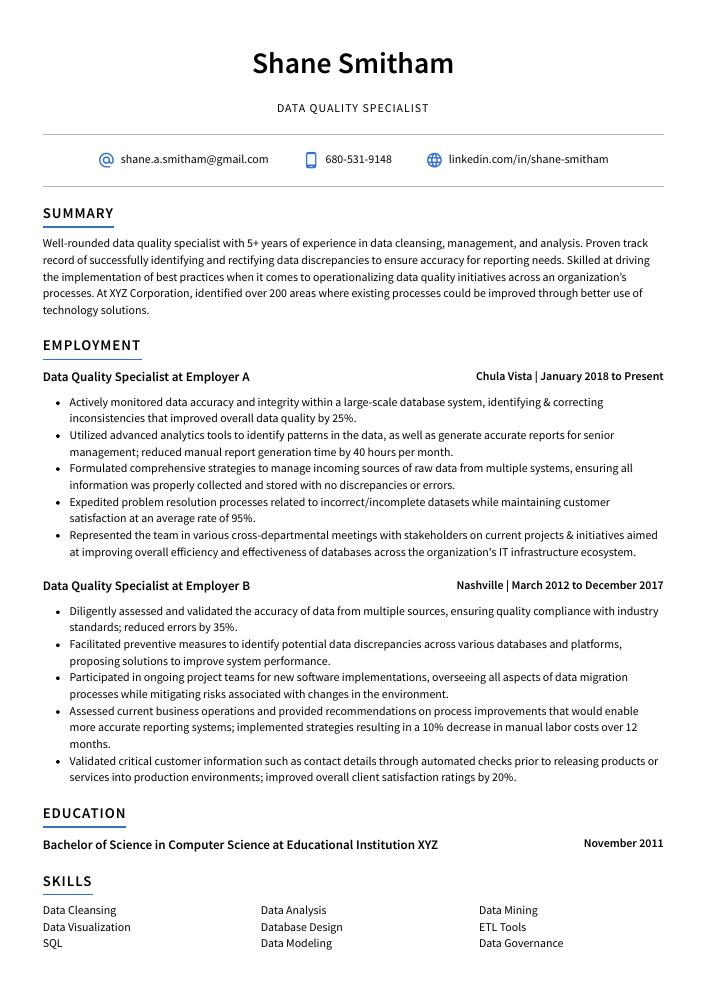Data Quality Specialist Resume Guide
Data Quality Specialists are responsible for ensuring that data is accurate and consistent. They analyze data to identify any issues or discrepancies, develop strategies to improve the accuracy of the data, and create reports on their findings. Additionally, they work with other departments within an organization to ensure that everyone is using standardized processes when collecting and entering information into databases.
You have the expertise to ensure data accuracy and integrity. But hiring managers don’t know that yet, so you must write a resume that captures their attention and highlights your qualifications as a Data Quality Specialist.
This guide will walk you through the entire process of creating a top-notch resume. We first show you a complete example and then break down what each resume section should look like.
Table of Contents
The guide is divided into sections for your convenience. You can read it from beginning to end or use the table of contents below to jump to a specific part.
Data Quality Specialist Resume Sample
Shane Smitham
Data Quality Specialist
[email protected]
680-531-9148
linkedin.com/in/shane-smitham
Summary
Well-rounded data quality specialist with 5+ years of experience in data cleansing, management, and analysis. Proven track record of successfully identifying and rectifying data discrepancies to ensure accuracy for reporting needs. Skilled at driving the implementation of best practices when it comes to operationalizing data quality initiatives across an organization’s processes. At XYZ Corporation, identified over 200 areas where existing processes could be improved through better use of technology solutions.
Experience
Data Quality Specialist, Employer A
Chula Vista, Jan 2018 – Present
- Actively monitored data accuracy and integrity within a large-scale database system, identifying & correcting inconsistencies that improved overall data quality by 25%.
- Utilized advanced analytics tools to identify patterns in the data, as well as generate accurate reports for senior management; reduced manual report generation time by 40 hours per month.
- Formulated comprehensive strategies to manage incoming sources of raw data from multiple systems, ensuring all information was properly collected and stored with no discrepancies or errors.
- Expedited problem resolution processes related to incorrect/incomplete datasets while maintaining customer satisfaction at an average rate of 95%.
- Represented the team in various cross-departmental meetings with stakeholders on current projects & initiatives aimed at improving overall efficiency and effectiveness of databases across the organization’s IT infrastructure ecosystem.
Data Quality Specialist, Employer B
Nashville, Mar 2012 – Dec 2017
- Diligently assessed and validated the accuracy of data from multiple sources, ensuring quality compliance with industry standards; reduced errors by 35%.
- Facilitated preventive measures to identify potential data discrepancies across various databases and platforms, proposing solutions to improve system performance.
- Participated in ongoing project teams for new software implementations, overseeing all aspects of data migration processes while mitigating risks associated with changes in the environment.
- Assessed current business operations and provided recommendations on process improvements that would enable more accurate reporting systems; implemented strategies resulting in a 10% decrease in manual labor costs over 12 months.
- Validated critical customer information such as contact details through automated checks prior to releasing products or services into production environments; improved overall client satisfaction ratings by 20%.
Skills
- Data Cleansing
- Data Analysis
- Data Mining
- Data Visualization
- Database Design
- ETL Tools
- SQL
- Data Modeling
- Data Governance
Education
Bachelor of Science in Computer Science
Educational Institution XYZ
Nov 2011
Certifications
Certified Data Quality Manager
Data Quality Institute
May 2017
1. Summary / Objective
A resume summary/objective is a great way to introduce yourself and your qualifications as a data quality specialist. In this section, you can highlight the key skills that make you stand out from other applicants such as experience with ETL processes, knowledge of SQL databases, and expertise in developing data governance strategies. You could also mention any certifications or awards related to data quality that demonstrate your commitment to excellence in this field.
Below are some resume summary examples:
Committed data quality specialist with 5+ years of experience in data analysis and validation. Adept at resolving discrepancies found in databases through comprehensive testing, validation, and debugging processes. At XYZ Inc., led the implementation of a new system to enhance data accuracy which resulted in improved customer satisfaction ratings by 20%. Proven ability to identify problems and develop effective solutions that drive organizational efficiency.
Passionate data quality specialist with 5+ years of experience in data analysis and quality assurance. Proven ability to monitor, detect, and analyze inconsistencies in databases for organizations such as ABC Corp. Utilize advanced problem-solving techniques to ensure accuracy across all customer records while meeting organizational goals. Successfully identified a critical issue that reduced the number of errors by 45%.
Dependable data quality specialist with 5+ years of experience in data analysis and management. Expertise in creating clean, high-quality datasets for decision making purposes. At XYZ Corporation, utilized SQL scripts to review existing databases and identified areas for improvement that increased accuracy by 20%. Proven ability to design efficient processes for verifying the integrity of large amounts of data.
Enthusiastic data quality specialist with 5+ years of experience validating data entry, cleaning and transforming datasets for analysis. Expert in developing monitoring systems to ensure data accuracy across all platforms. Seeking to leverage exemplary problem-solving skills and knowledge of SQL at ABC Tech to create robust solutions that meet the highest standards of industry compliance.
Diligent data quality specialist with 3+ years of experience analyzing and validating data to ensure accuracy, completeness, and compliance. Skilled in developing automated solutions that streamline the data-validation process by up to 25%. Seeking a position at ABC Tech where my expertise can be used to help improve overall business performance through better data quality management.
Hard-working data quality specialist with 5+ years of experience in data analysis and management. Expertise in developing strategies to improve the accuracy, completeness, timeliness, and consistency of organizational datasets. Passionate about helping ABC Tech ensure their data is reliable and up-to-date by leveraging innovative technologies such as machine learning algorithms.
Determined data quality specialist with 5+ years of experience in data analysis and ETL processes. Passionate about building secure and efficient systems that enable businesses to maximize their ROI from the valuable data they have collected. Seeking to join ABC Tech as a Data Quality Specialist, leveraging expertise in SQL, Python, JavaScript, and NoSQL technologies.
Driven data quality specialist with a passion for ensuring accuracy and completeness of data. Experienced in working on large-scale projects, managing multiple stakeholders, and troubleshooting issues related to data integrity. At XYZ Corporation improved the efficiency of data management processes by 33%. Received company recognition award for contribution.
2. Experience / Employment
For the experience section, you should list your employment history in reverse chronological order. This means that the most recent job is listed first.
When writing about what you did, use bullet points to make it easier for the reader to digest the information quickly. You want to provide detail on what you did and any quantifiable results achieved.
For example, instead of saying “Monitored data quality,” you could say, “Reviewed over 1 million records daily for accuracy and completeness; identified discrepancies with a 98% success rate.”
To write effective bullet points, begin with a strong verb or adverb. Industry specific verbs to use are:
- Analyzed
- Monitored
- Evaluated
- Assessed
- Investigated
- Resolved
- Documented
- Implemented
- Optimized
- Automated
- Reconciled
- Enforced
- Validated
- Improved
Other general verbs you can use are:
- Achieved
- Advised
- Compiled
- Coordinated
- Demonstrated
- Developed
- Expedited
- Facilitated
- Formulated
- Introduced
- Mentored
- Participated
- Prepared
- Presented
- Reduced
- Reorganized
- Represented
- Revised
- Spearheaded
- Streamlined
- Structured
- Utilized
Below are some example bullet points:
- Coordinated the quality assurance of over 1,000 datasets monthly to ensure accuracy and completeness; reduced errors in data by 30%.
- Efficiently redesigned the database structure for higher performance and scalability while maintaining data integrity.
- Reorganized 7TB of complex customer databases with multiple interrelated tables into easily accessible structures; improved retrieval speed by 20%.
- Developed a suite of automated scripts that validated incoming data against predefined criteria to quickly detect any irregularities or inconsistencies within records.
- Reconciled discrepancies between source systems using advanced SQL queries & Excel functions, resulting in a 98% reduction in manual correction tasks over 6 months.
- Resourcefully identified and corrected data quality issues across multiple business systems, improving accuracy of information by 70% in 3 months.
- Structured test plans to evaluate the performance of new databases and software applications; identified 10+ potential improvement areas for development teams.
- Investigated discrepancies between source system records and internal documentation, resulting in a 5% reduction in manual data entry errors within 6 weeks.
- Presented monthly reports on overall database performance to managers, highlighting any inconsistencies with agreed standards or regulations; led 2 targeted training sessions based on these findings which improved compliance rate by 8%.
- Resolved customer queries related to inaccuracies found within their online accounts through extensive data analysis activities; reduced query backlogs by 45%.
- Optimized data quality control processes, increasing accuracy by 45% while reducing manual labor by 40%.
- Introduced best practices for data management and analysis, resulting in a 20% decrease of errors and discrepancies in the system.
- Analyzed over 500 datasets to identify potential issues with inaccuracies or inconsistencies; successfully identified 99% of incongruities before they impacted business operations.
- Meticulously planned & executed data cleansing initiatives that improved overall performance and provided meaningful insights into customer trends & behaviors within the company’s databases.
- Automated routine tasks related to validating input fields on forms, which saved 10 hours per week across all departments working with client-facing systems.
- Documented data quality metrics and specifications in accordance with ISO standards; reduced data entry errors by 40% within two months.
- Advised management on best practices for ensuring compliance with GDPR, HIPAA, CCPA and other privacy regulations; successfully implemented new protocols which improved overall security of sensitive customer information.
- Prepared detailed reports outlining the current state of data integrity across all databases used within the organization; identified & resolved over 100 issues related to inconsistency or duplication in recordkeeping systems.
- Demonstrated advanced ability to manipulate large datasets using SQL queries & Python programming language to detect errors quickly and efficiently; increased accuracy rate from 80% to 98%.
- Successfully optimized existing technology infrastructure that enabled staff members at multiple locations around the world access real-time insights into company’s performance indicators without compromising privacy policies or causing disruptions due server overloads.
- Implemented data validation processes to ensure accuracy and completeness of data, resulting in an overall decrease of 6% errors in customer records.
- Compiled comprehensive monthly reports on data quality metrics such as accuracy, consistency and validity; proposed measures that improved the speed of report generation by 8 hours per week.
- Evaluated existing database structures for potential improvement opportunities, streamlining databases where possible while preserving security protocols; reduced processing time for requests by 20%.
- Monitored daily system transactions to identify inconsistencies and inaccuracies in data input or transfer activities; successfully addressed over 250 issues within a three-month period with no recurrences reported since then.
- Consistently applied industry standards when dealing with sensitive personal information (HIPAA & PII) during all stages of testing procedures, achieving 100% compliance rate from external auditors during annual reviews.
- Spearheaded the development of data quality processes, developing and implementing new procedures that resulted in a 20% improvement in overall accuracy.
- Achieved 98% customer satisfaction ratings by continuously monitoring and verifying the integrity of organizational databases for accuracy and consistency; identified errors promptly to ensure timely corrections were made.
- Mentored junior analysts on best practices for identifying, analyzing, interpreting and resolving data-related issues; proactively provided feedback to increase their performance efficiency by 30%.
- Thoroughly reviewed existing systems configurations related to databases based on business requirements while creating associated documentation such as flowcharts & process diagrams; reduced user queries/issues by 45%.
- Improved key metrics such as availability & uptime with proactive maintenance efforts that minimized downtime incidents from 2 hours per week to under 15 minutes per month.
- Reliably monitored and maintained data accuracy across the organization, ensuring that all systems were in accordance with established standards and regulations; reduced errors by 30%.
- Streamlined existing processes for reviewing, validating and auditing data to identify inconsistencies or inaccuracies in a timely manner within given deadlines.
- Enforced quality control measures throughout the entire life cycle of databases from inception through implementation; improved overall system performance by 40%.
- Reduced manual entry errors associated with entering customer information into database software programs by introducing automated procedures & redundancies to ensure accurate inputting of records.
- Revised policies & procedures related to data collection techniques, storage protocols & retrieval methods while providing training sessions on best practices for working with sensitive information securely.
3. Skills
Even though two organizations are hiring for the same role, the skillset they want an ideal candidate to possess could differ significantly. For instance, one may be on the lookout for an individual with experience in data validation and another for someone with expertise in database management.
It is essential to tailor the skills section of your resume according to each job you are applying for, as many employers use applicant tracking systems that scan resumes for certain keywords before passing them on to a human.
In addition, it would be beneficial if you could elaborate further on your most relevant skillset by discussing it in more detail elsewhere – such as the summary or experience sections.
Below is a list of common skills & terms:
- Data Analysis
- Data Cleansing
- Data Governance
- Data Mining
- Data Modeling
- Data Security
- Data Visualization
- Database Design
- ETL Tools
- SQL
4. Education
Mentioning your education on your resume depends on how far along you are in your career. If you recently graduated and have no prior experience, include an education section below the resume objective. On the other hand, if you already have significant work experience related to data quality specialist roles, it is not necessary to mention your education at all.
If including an education section is a must for you, try to list courses and subjects relevant to data quality specialist jobs that will help demonstrate why you’re qualified for the position.
Bachelor of Science in Computer Science
Educational Institution XYZ
Nov 2011
5. Certifications
Certifications demonstrate to a potential employer that you have the necessary knowledge and skills required for the job. They also show that you are committed to staying up-to-date with industry trends and best practices.
Including certifications on your resume is an excellent way of showing employers how qualified you are for the position, so make sure to include any relevant ones in this section.
Certified Data Quality Manager
Data Quality Institute
May 2017
6. Contact Info
Your name should be the first thing a reader sees when viewing your resume, so ensure its positioning is prominent. Your phone number should be written in the most commonly used format in your country/city/state, and your email address should be professional.
You can also choose to include a link to your LinkedIn profile, personal website, or other online platforms relevant to your industry.
Finally, name your resume file appropriately to help hiring managers; for Shane Smitham, this would be Shane-Smitham-resume.pdf or Shane-Smitham-resume.docx.
7. Cover Letter
Attaching a cover letter to your job application is an excellent way to make yourself stand out from the competition. It serves as a platform for you to explain why you are the perfect candidate for the role and provide recruiters with more insights about who you are.
A cover letter should be written up of 2-4 paragraphs and include information that isn’t already mentioned in your resume. This allows employers to get a better understanding of what makes you unique, helping them decide whether or not they would like to invite you in for an interview.
Below is an example cover letter:
Dear Frankie,
I am writing to apply for the position of Data Quality Specialist at XYZ Corporation. With my experience in data analysis and quality assurance, as well as my strong attention to detail, I am confident that I would be a valuable asset to your team.
In my current role as a Data Analyst at ABC Company, I am responsible for ensuring the accuracy and quality of our customer data. I have developed strong skills in data mining and cleansing, as well as creating reports and visualizations to communicate findings. In addition, I have experience leading projects and teams of analysts in order to achieve project goals.
Through my work experiences, I have become an expert in identifying patterns and trends in data sets. This has allowed me to develop creative solutions to complex problems related to data quality. My analytical skills combined with my ability to think outside the box would enable me contribute effectively to your organization’s success.
I look forward to discussing how my qualifications can benefit your company further during an interview. Thank you for your time and consideration; please do not hesitate to contact me if you have any questions or need clarification on any points contained within this letter or my attached resume.
Sincerely,
Shane
Data Quality Specialist Resume Templates
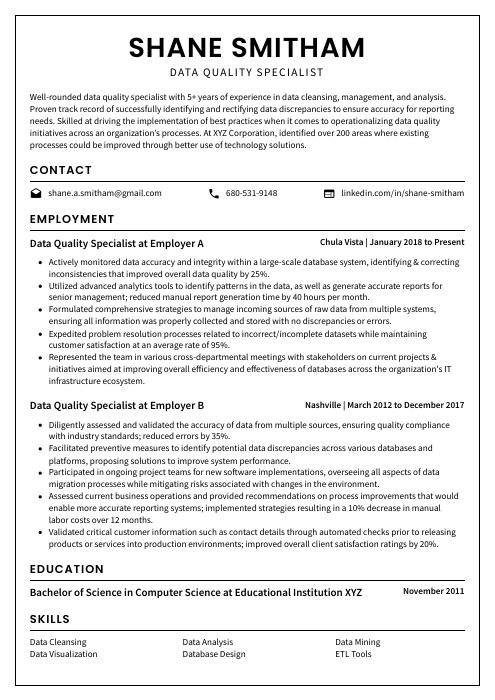 Cormorant
Cormorant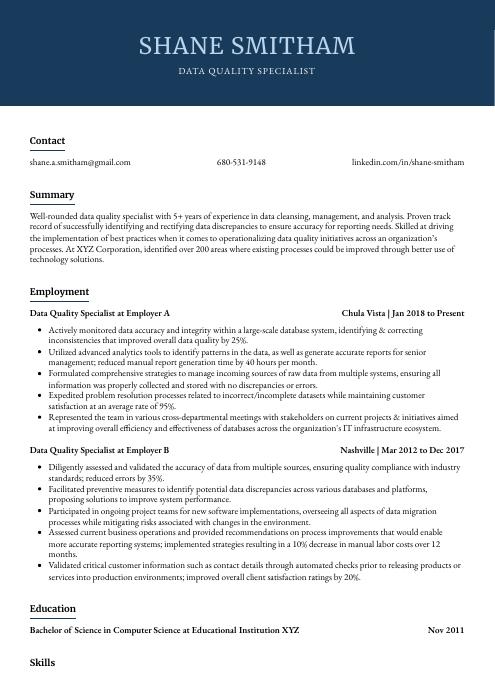 Bonobo
Bonobo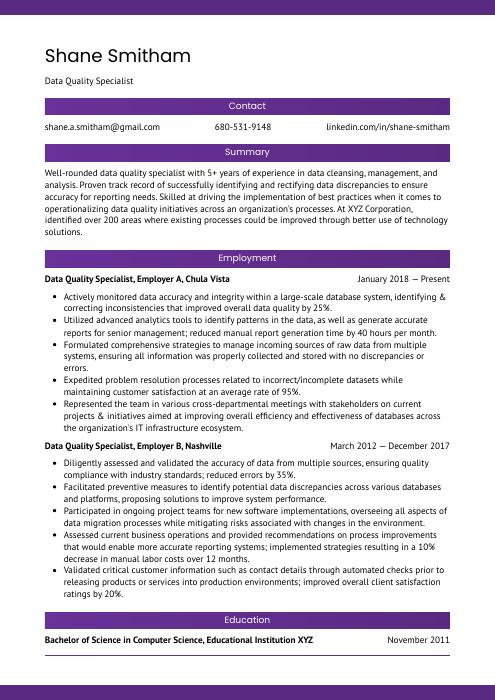 Jerboa
Jerboa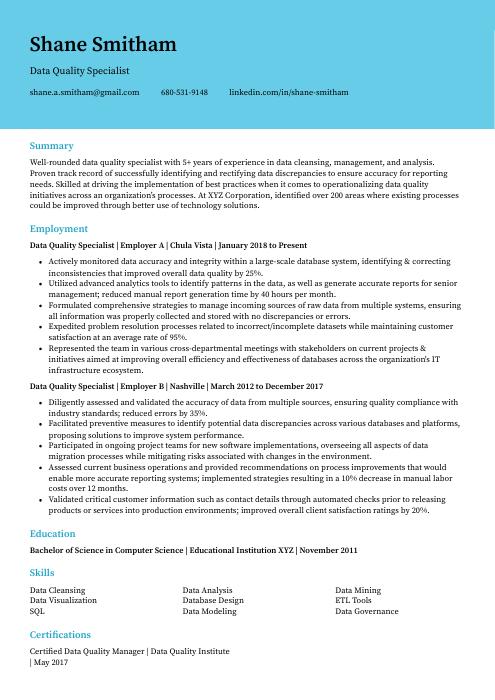 Dugong
Dugong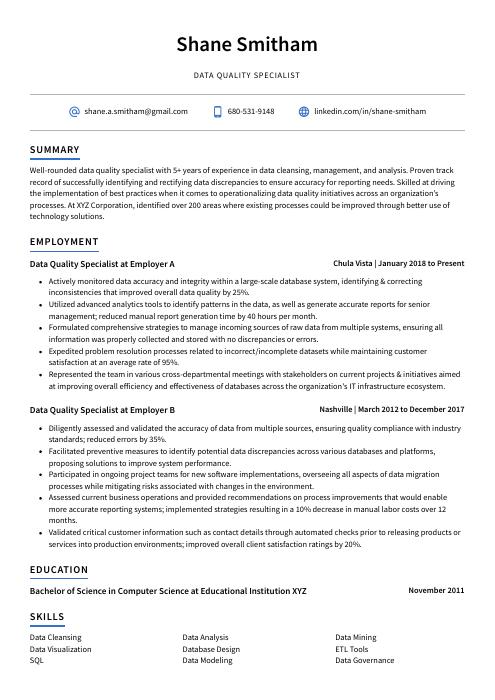 Axolotl
Axolotl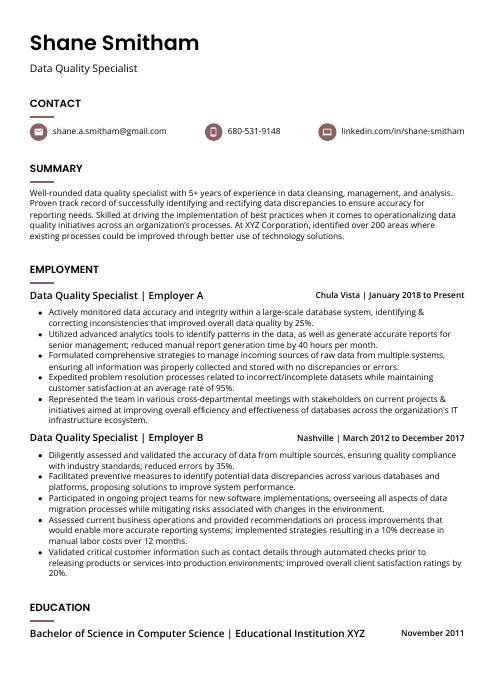 Fossa
Fossa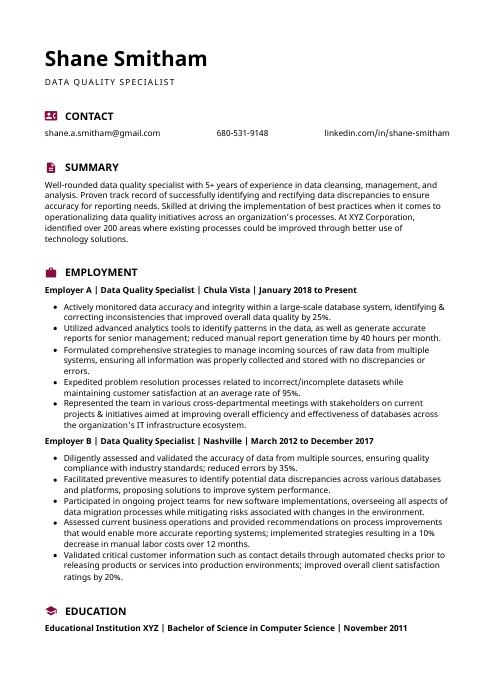 Hoopoe
Hoopoe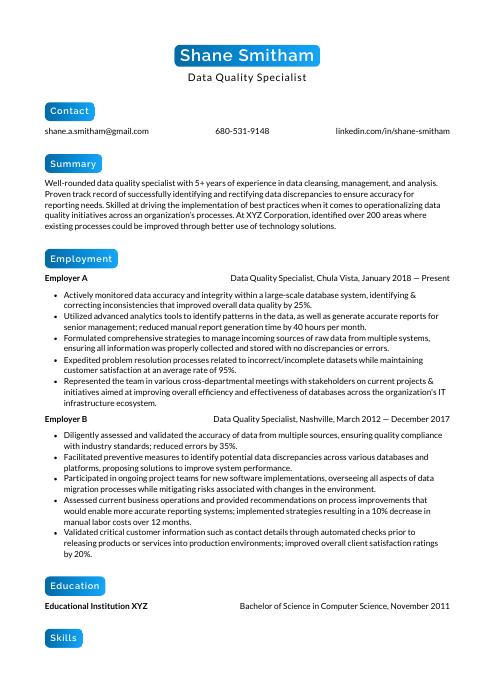 Kinkajou
Kinkajou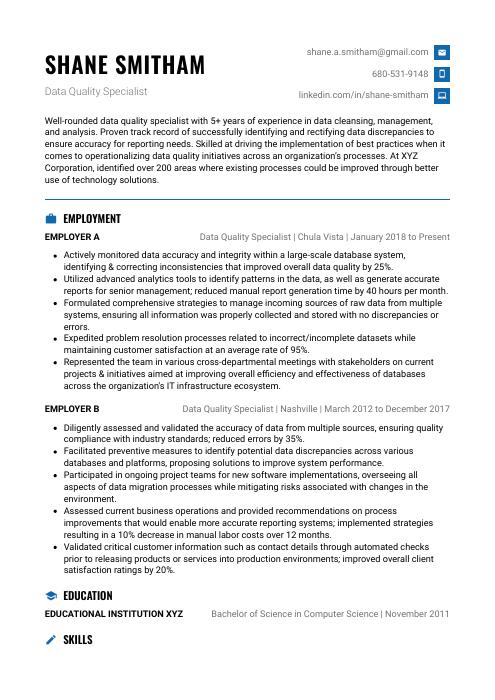 Echidna
Echidna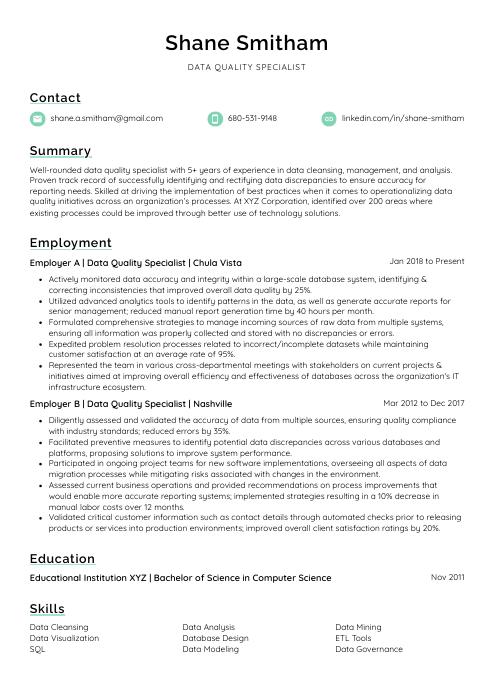 Lorikeet
Lorikeet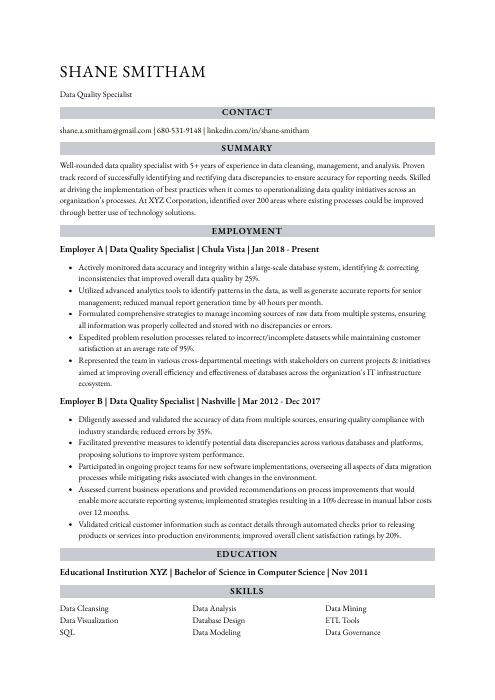 Numbat
Numbat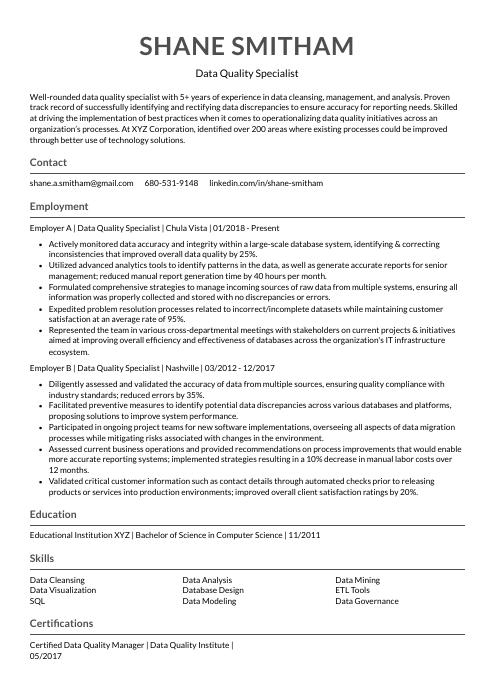 Indri
Indri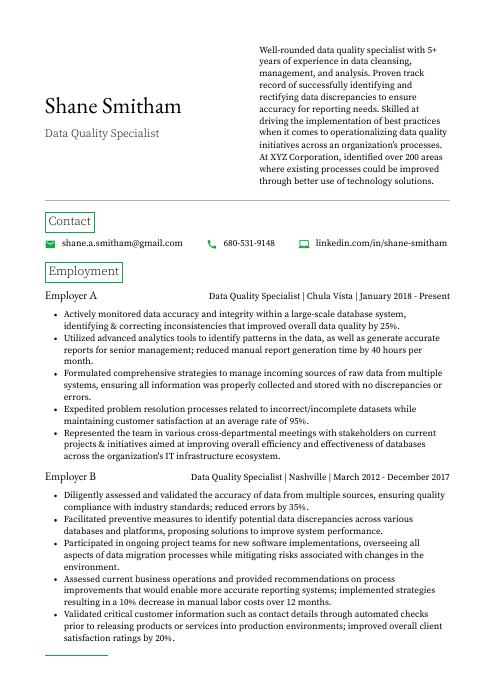 Quokka
Quokka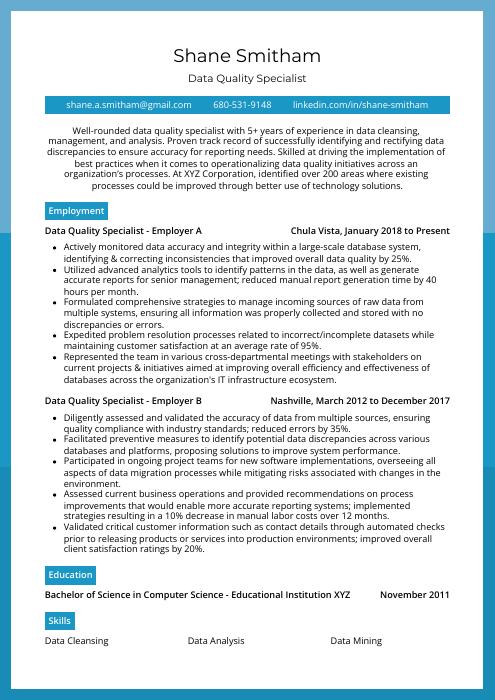 Rhea
Rhea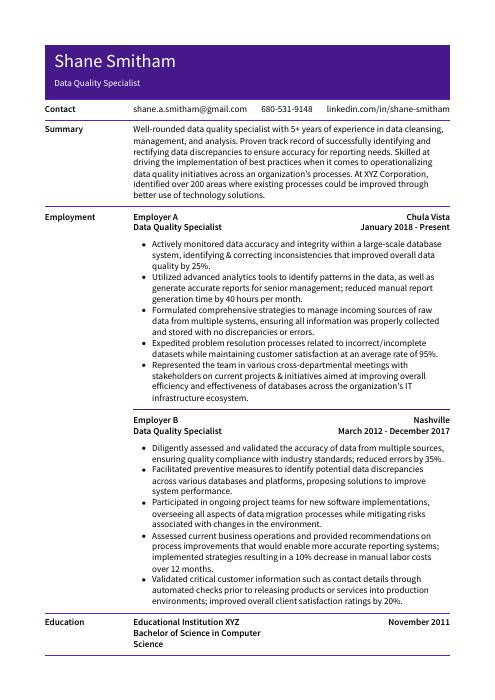 Pika
Pika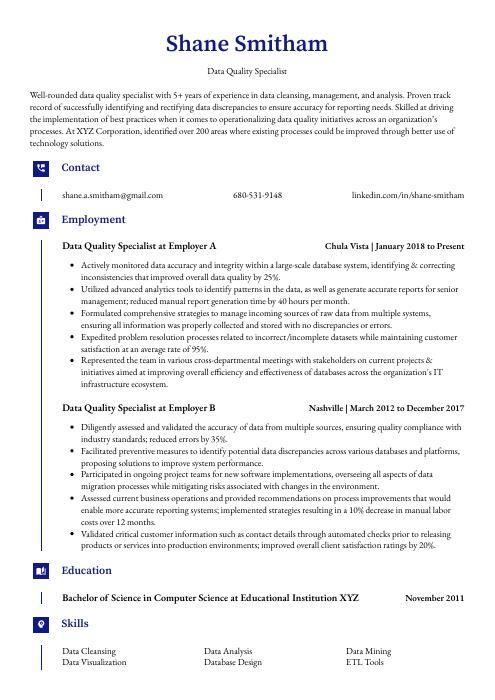 Gharial
Gharial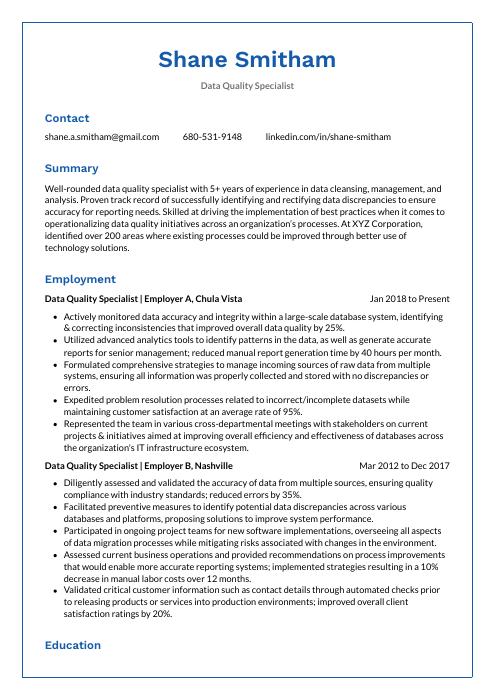 Markhor
Markhor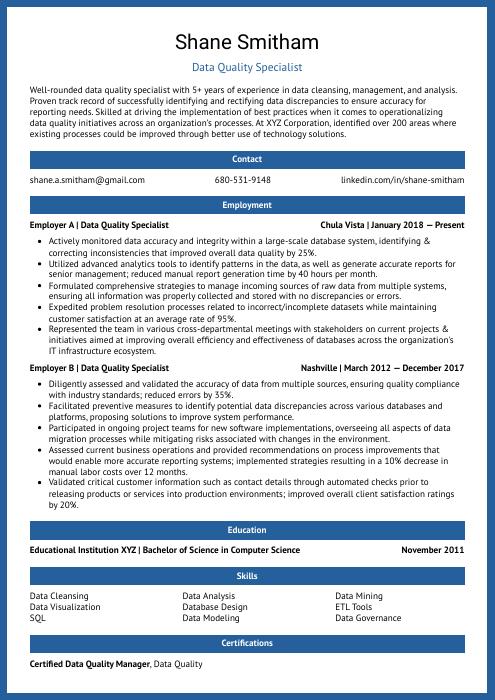 Ocelot
Ocelot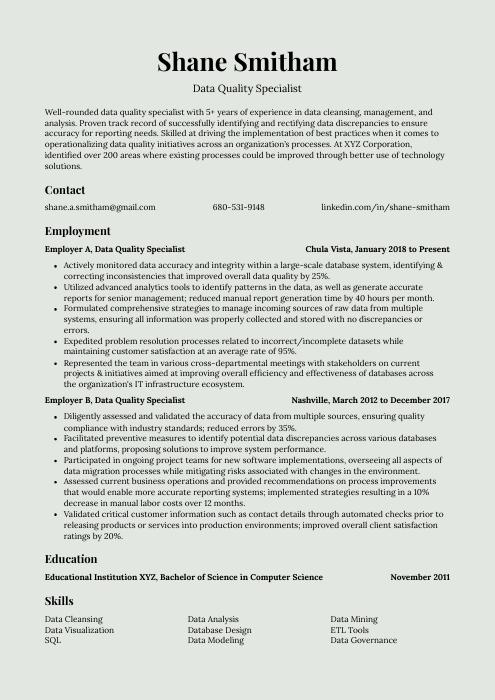 Saola
Saola Rezjumei
Rezjumei
